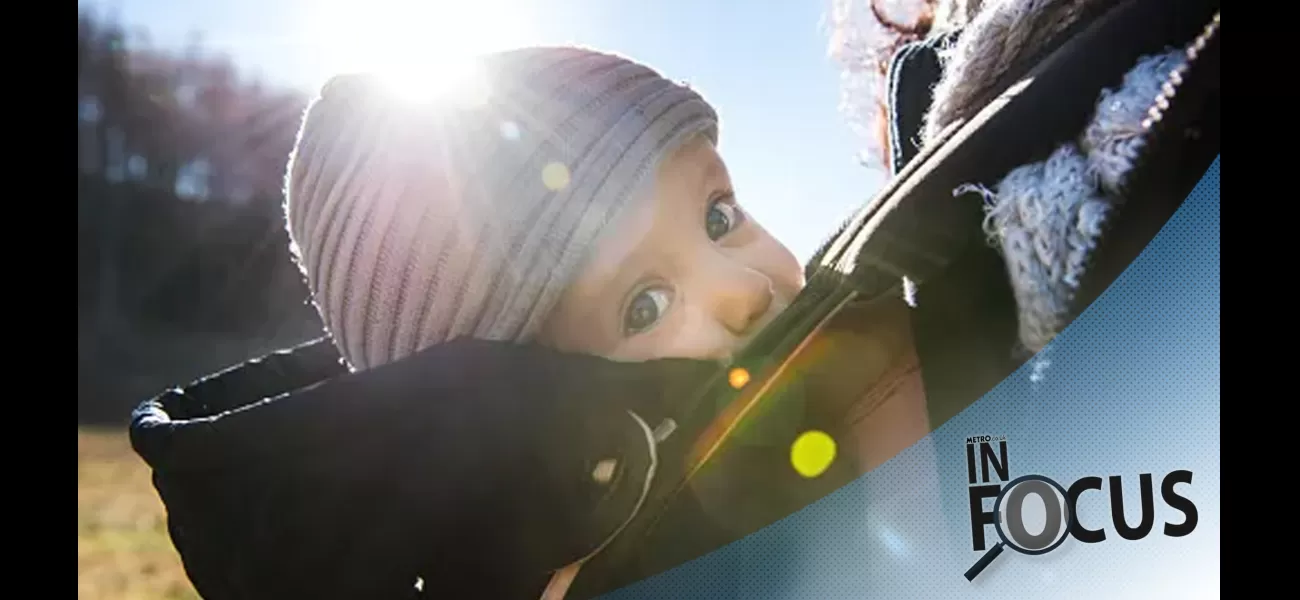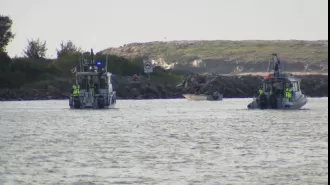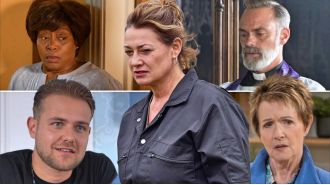Being a parent pushed me to my limits, but one small thing helped me recover.
It has not only restored my life, but also enabled me to create a whole new one.
February 17th 2024.

It was a real turning point for Ruth Dobson when she finally reached her breaking point after three consecutive sleepless nights. As a new mom to baby Lyra, born nine weeks earlier in June 2021, Ruth had been struggling with intense anxiety and insomnia. The extreme heatwave in the country only added to her worries and fears. She would spend the night lying awake, constantly checking on her newborn's temperature and listening to her breathing, while her mind catastrophized about all the potential dangers that could harm her precious daughter.
Despite putting on a brave face and appearing to have it all together, Ruth, now 38, was falling apart on the inside. As a social mental health researcher, she was well aware of postnatal depression, but she didn't recognize the symptoms in herself. It's a common experience for those struggling with mental health issues to lack insight into their own condition. Ruth lived in Sheffield with her family and decided to join Blaze Trails after being diagnosed with postnatal depression.
"At one point, it got so bad for me that I just felt like my life was over. I was terrified that someone would take Lyra away from me. I wasn't suicidal, but I remember telling my dad, 'It's all over. There's no happiness left,'" Ruth recalls.
Feeling overwhelmed and crying every day, Ruth sought help from health professionals, but was told that her feelings were just a normal part of being a new mom. Her GP prescribed antidepressants to help her sleep, but she was hesitant to take them. It wasn't until the third sleepless night that Ruth reached out to her dad, Patrick, who was on vacation at the time. She expressed her fear of another night of sleeplessness and dark thoughts, and her dad immediately dropped everything to come to her aid.
With the help of Ruth's parents and other grandparents, Patrick took turns helping with cooking, cleaning, and looking after baby Lyra so that Ruth could get some much-needed rest. Her dad also took her to see a perinatal mental health team, who diagnosed her with postnatal depression. Ruth was prescribed Sertraline as part of her recovery, and she also started going for walks outside of the house.
"I would start out in the morning, stop for a coffee or lunch, sit on benches, and walk until it got dark," Ruth shares. "It was better than staying indoors all day. As soon as you step out of the front door, you take a deep breath and everything feels better."
Ruth searched for walking groups for parents online and came across Blaze Trails, a nationwide charity. Five months after her diagnosis, she joined their walking group.
"It was a real turning point for me," she admits. "Walking introduced me to new friends that I still see now, gave me a focus and routine, and reconnected me with my own identity."
The idea for Blaze Trails was born in 2017 when founder Katy O'Neill Gutierrez, an outdoor enthusiast, couldn't find a walking group for moms and babies in her area. Determined not to let that stop her, she started her own group in North London. Before long, the group was exploring new locations every week with a growing number of members.
Since then, Blaze Trails has become the UK's largest parent and baby walking community, with over 55 groups and 30,000 members across the country. All walks are free and led by volunteers.
While the majority of members are women on maternity leave, new dad Julian Wright found the group to be a refreshing change from other baby groups. The 42-year-old engineer from Shrewsbury even compressed his work schedule to spend Fridays with his firstborn. However, Julian found traditional baby groups noisy, stressful, and unwelcoming.
"We were new to the area, and I tried a few groups, but they were just a bit awkward," he shares. "A lot of people say the same thing - some groups can be cliquey and difficult to make friends with. I would often be the only guy, and it wasn't very fulfilling."
Last February, Julian discovered Blaze Trails and mentioned it to his partner, Helena, who was already a member but had never attended. They decided to go together, and Julian was immediately drawn to the group.
"It was like night and day. The group was eager to come up and talk to me," he recalls. "We had deep conversations about our experiences in the hospital and other difficult memories. I could never imagine having those conversations in a traditional group setting. There's just something about walking and talking that makes it easier to open up."
Ruth Dobson was a new mom, completely overwhelmed and exhausted. She had been struggling with anxiety and insomnia since the birth of her daughter, Lyra, nine weeks earlier in June 2021. The extreme heatwave in the country only added to her worries, keeping her awake at night and fearful for her newborn's safety. Ruth would constantly check Lyra's temperature and listen to her breathing, imagining all the worst things that could happen to her tiny daughter.
Despite appearing put together on the outside, with a clean house and well-kept appearance, Ruth was falling apart on the inside. As a social mental health researcher, she was surprised that she didn't even recognize her own postnatal depression. This lack of insight is a common symptom of mental illness, and Ruth's experience was no exception. She lived in Sheffield with her family and eventually sought help from Blaze Trails after being diagnosed with postnatal depression.
Ruth recalls a turning point when she hit rock bottom. She remembers feeling like her life was over and that Lyra would be taken away from her. While she wasn't suicidal, she couldn't see any happiness left in her future. Despite seeking help from health professionals, she was told that her feelings were normal for a new mom. Her doctor prescribed antidepressants, but she was hesitant to take them.
It was after the third consecutive sleepless night that Ruth called her father, Patrick, in a state of desperation. He was on his summer holiday at the time, but he immediately dropped everything to come and help his daughter. Along with the other grandparents, Patrick took turns caring for Lyra and helping with household chores, giving Ruth the opportunity to get some much-needed rest. He also accompanied her to see the perinatal mental health team, who diagnosed her with postnatal depression.
As part of her recovery, Ruth was prescribed medication and started going for walks outside of the house. She would stop for coffee or lunch, sit on benches, and walk until it got dark. It was a small step, but it made a big difference in her mental health. Ruth found Blaze Trails, a nationwide charity for parents, through a Google search for walking groups. She started walking with them five months after being diagnosed with postnatal depression.
Joining Blaze Trails was a turning point for Ruth. She made new friends, established a routine, and reconnected with her own identity. The idea for this walking group specifically for parents was born in 2017 when founder Katy O'Neill Gutierrez, an outdoors enthusiast, couldn't find a similar group in her local area. She started her own and soon had a growing group of like-minded individuals exploring new locations every week.
Since then, Blaze Trails has become the UK's largest parent and baby walking community with over 55 groups and 30,000 members across the country. All walks are free and led by volunteers. While the majority of attendees are women on maternity leave, new dad Julian Wright found the group to be a refreshing change from other baby groups. The 42-year-old engineer from Shrewsbury even compressed his work week into four days so he could spend Fridays with his firstborn.
Julian had tried other baby groups in the area, but found them noisy, stressful, and unwelcoming at times. When he discovered Blaze Trails in February of last year, he mentioned it to his partner Helena, who was already a member. They attended a walk together and Julian was immediately drawn in by the friendly and open atmosphere. The group members were eager to talk and share their experiences, creating a safe and supportive environment for Julian to open up about his own struggles as a new dad.
Walking and talking with the group made it easier for Julian to discuss difficult topics, such as hospital experiences and difficult memories, that he wouldn't have felt comfortable discussing in a traditional setting. The combination of fresh air, exercise, and meaningful conversations made Blaze Trails a truly valuable and transformative experience for both Ruth and Julian.
Despite putting on a brave face and appearing to have it all together, Ruth, now 38, was falling apart on the inside. As a social mental health researcher, she was well aware of postnatal depression, but she didn't recognize the symptoms in herself. It's a common experience for those struggling with mental health issues to lack insight into their own condition. Ruth lived in Sheffield with her family and decided to join Blaze Trails after being diagnosed with postnatal depression.
"At one point, it got so bad for me that I just felt like my life was over. I was terrified that someone would take Lyra away from me. I wasn't suicidal, but I remember telling my dad, 'It's all over. There's no happiness left,'" Ruth recalls.
Feeling overwhelmed and crying every day, Ruth sought help from health professionals, but was told that her feelings were just a normal part of being a new mom. Her GP prescribed antidepressants to help her sleep, but she was hesitant to take them. It wasn't until the third sleepless night that Ruth reached out to her dad, Patrick, who was on vacation at the time. She expressed her fear of another night of sleeplessness and dark thoughts, and her dad immediately dropped everything to come to her aid.
With the help of Ruth's parents and other grandparents, Patrick took turns helping with cooking, cleaning, and looking after baby Lyra so that Ruth could get some much-needed rest. Her dad also took her to see a perinatal mental health team, who diagnosed her with postnatal depression. Ruth was prescribed Sertraline as part of her recovery, and she also started going for walks outside of the house.
"I would start out in the morning, stop for a coffee or lunch, sit on benches, and walk until it got dark," Ruth shares. "It was better than staying indoors all day. As soon as you step out of the front door, you take a deep breath and everything feels better."
Ruth searched for walking groups for parents online and came across Blaze Trails, a nationwide charity. Five months after her diagnosis, she joined their walking group.
"It was a real turning point for me," she admits. "Walking introduced me to new friends that I still see now, gave me a focus and routine, and reconnected me with my own identity."
The idea for Blaze Trails was born in 2017 when founder Katy O'Neill Gutierrez, an outdoor enthusiast, couldn't find a walking group for moms and babies in her area. Determined not to let that stop her, she started her own group in North London. Before long, the group was exploring new locations every week with a growing number of members.
Since then, Blaze Trails has become the UK's largest parent and baby walking community, with over 55 groups and 30,000 members across the country. All walks are free and led by volunteers.
While the majority of members are women on maternity leave, new dad Julian Wright found the group to be a refreshing change from other baby groups. The 42-year-old engineer from Shrewsbury even compressed his work schedule to spend Fridays with his firstborn. However, Julian found traditional baby groups noisy, stressful, and unwelcoming.
"We were new to the area, and I tried a few groups, but they were just a bit awkward," he shares. "A lot of people say the same thing - some groups can be cliquey and difficult to make friends with. I would often be the only guy, and it wasn't very fulfilling."
Last February, Julian discovered Blaze Trails and mentioned it to his partner, Helena, who was already a member but had never attended. They decided to go together, and Julian was immediately drawn to the group.
"It was like night and day. The group was eager to come up and talk to me," he recalls. "We had deep conversations about our experiences in the hospital and other difficult memories. I could never imagine having those conversations in a traditional group setting. There's just something about walking and talking that makes it easier to open up."
Ruth Dobson was a new mom, completely overwhelmed and exhausted. She had been struggling with anxiety and insomnia since the birth of her daughter, Lyra, nine weeks earlier in June 2021. The extreme heatwave in the country only added to her worries, keeping her awake at night and fearful for her newborn's safety. Ruth would constantly check Lyra's temperature and listen to her breathing, imagining all the worst things that could happen to her tiny daughter.
Despite appearing put together on the outside, with a clean house and well-kept appearance, Ruth was falling apart on the inside. As a social mental health researcher, she was surprised that she didn't even recognize her own postnatal depression. This lack of insight is a common symptom of mental illness, and Ruth's experience was no exception. She lived in Sheffield with her family and eventually sought help from Blaze Trails after being diagnosed with postnatal depression.
Ruth recalls a turning point when she hit rock bottom. She remembers feeling like her life was over and that Lyra would be taken away from her. While she wasn't suicidal, she couldn't see any happiness left in her future. Despite seeking help from health professionals, she was told that her feelings were normal for a new mom. Her doctor prescribed antidepressants, but she was hesitant to take them.
It was after the third consecutive sleepless night that Ruth called her father, Patrick, in a state of desperation. He was on his summer holiday at the time, but he immediately dropped everything to come and help his daughter. Along with the other grandparents, Patrick took turns caring for Lyra and helping with household chores, giving Ruth the opportunity to get some much-needed rest. He also accompanied her to see the perinatal mental health team, who diagnosed her with postnatal depression.
As part of her recovery, Ruth was prescribed medication and started going for walks outside of the house. She would stop for coffee or lunch, sit on benches, and walk until it got dark. It was a small step, but it made a big difference in her mental health. Ruth found Blaze Trails, a nationwide charity for parents, through a Google search for walking groups. She started walking with them five months after being diagnosed with postnatal depression.
Joining Blaze Trails was a turning point for Ruth. She made new friends, established a routine, and reconnected with her own identity. The idea for this walking group specifically for parents was born in 2017 when founder Katy O'Neill Gutierrez, an outdoors enthusiast, couldn't find a similar group in her local area. She started her own and soon had a growing group of like-minded individuals exploring new locations every week.
Since then, Blaze Trails has become the UK's largest parent and baby walking community with over 55 groups and 30,000 members across the country. All walks are free and led by volunteers. While the majority of attendees are women on maternity leave, new dad Julian Wright found the group to be a refreshing change from other baby groups. The 42-year-old engineer from Shrewsbury even compressed his work week into four days so he could spend Fridays with his firstborn.
Julian had tried other baby groups in the area, but found them noisy, stressful, and unwelcoming at times. When he discovered Blaze Trails in February of last year, he mentioned it to his partner Helena, who was already a member. They attended a walk together and Julian was immediately drawn in by the friendly and open atmosphere. The group members were eager to talk and share their experiences, creating a safe and supportive environment for Julian to open up about his own struggles as a new dad.
Walking and talking with the group made it easier for Julian to discuss difficult topics, such as hospital experiences and difficult memories, that he wouldn't have felt comfortable discussing in a traditional setting. The combination of fresh air, exercise, and meaningful conversations made Blaze Trails a truly valuable and transformative experience for both Ruth and Julian.
[This article has been trending online recently and has been generated with AI. Your feed is customized.]
[Generative AI is experimental.]
0
0
Submit Comment





